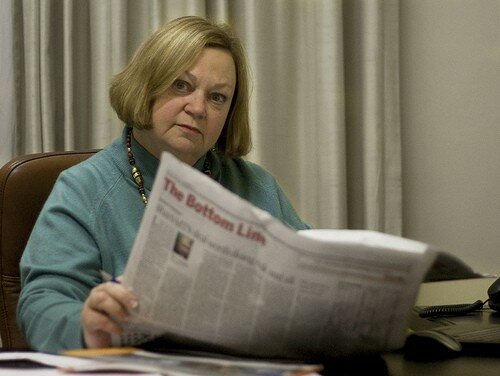
Marian Shinn. Image courtesy of The Democratic Alliance.
The election manifesto of South Africa’s ruling African National Congress (ANC) “skimmed the surface of ICT”, according to shadow communications minister for the Democratic Alliance (DA) Marian Shinn, failing to pay the sector due attention as a critical infrastructure for economic growth.
HumanIPO reported earlier today on the launch of the ANC manifesto, which promised South Africans free Wi-Fi, with the DA also releasing its own plans in the event of it winning this year’s election.
Shinn said the ANC manifesto was light on detail and gave no indication the ruling party was prioritising the sector in the way it needed to be.
“The ANC manifesto skimmed the surface of ICT and didn’t give it due weight as a critical infrastructure component in growing the economy to increase wealth and job creation, and to enable people to interact more efficiently with government to apply for grants and licences, for example,” she said.
She also took issue with the promise to provide free Wi-Fi in order to accelerate the rollout of broadband to 90 per cent of the country’s population by 2020.
“There is no such thing as free Wi-Fi – the costs of spectrum, installation and management are far too high – this is why those who provide it are either subsidising the provision through ratepayers and taxpayers or are being paid by commercial entities on a sponsorships basis,” Shinn said, though she did admit the potential benefits of making free Wi-Fi facilities available to people using governments services.
The ANC manifesto also reiterated the government’s commitment to the National Broadband Policy, Strategy and Plan, which aims to provide the vast majority of South Africans with internet connections and was gazetted last month.
Shinn said though the plan was a step forward it remained to be seen how effective it would be, or how the ANC planned to push it through.
“The broadband rollout and connection of all schools has been muddling along for years with no sense that these are priority projects,” she said. “The revised broadband policy gazetted at the end of the year is an improvement on previous iterations but we wait to see how government will respond to sector feedback and how much energy and innovative financing it will invest in it. Government does not have the capacity or money to do this alone and how open it will be to private sector partnerships will be a contested area that could impede progress.”
According to the Shinn, there is “no indication” of how the ANC plans to connect all schools in the country to broadband within six years, which she said was a “massive task requiring huge investment in infrastructure, equipment, teacher training and software development”.
She said her major concern was that the ANC policies would give government a leading role in the sector, with “private sector needs coming as an afterthought”. This is in contrast to the DA policy, which includes breaking up and selling off the South African Broadcasting Corporation (SABC), and fully privatising the likes of Telkom, Broadband Infraco and Sentech.

















